中考现在完成时课件中考英语复习人教版(共39张PPT)
文档属性
| 名称 | 中考现在完成时课件中考英语复习人教版(共39张PPT) |  | |
| 格式 | pptx | ||
| 文件大小 | 84.2MB | ||
| 资源类型 | 教案 | ||
| 版本资源 | 通用版 | ||
| 科目 | 英语 | ||
| 更新时间 | 2022-09-02 14:58:12 | ||
图片预览

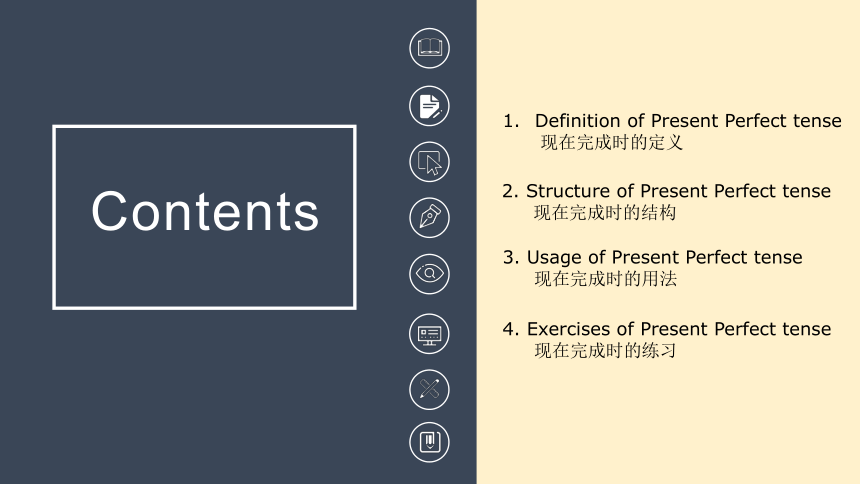
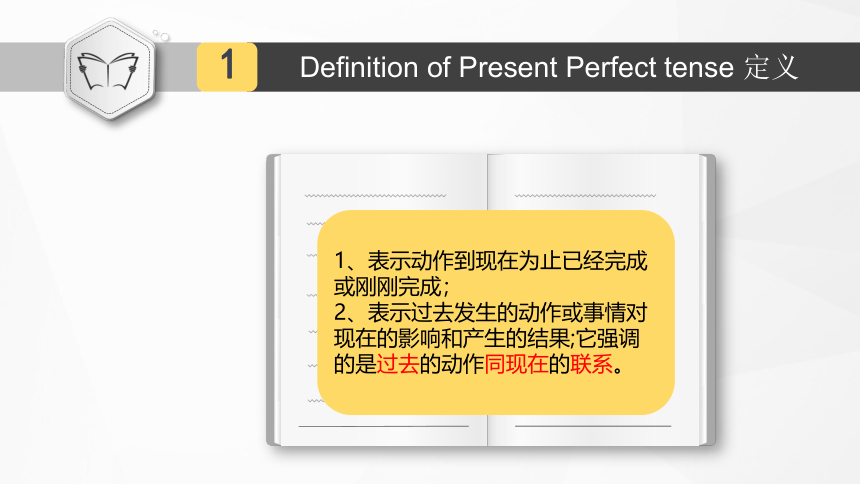
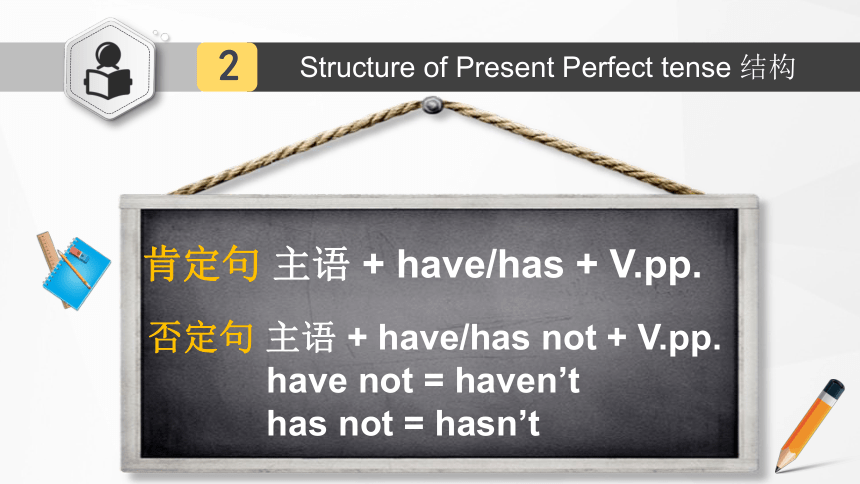
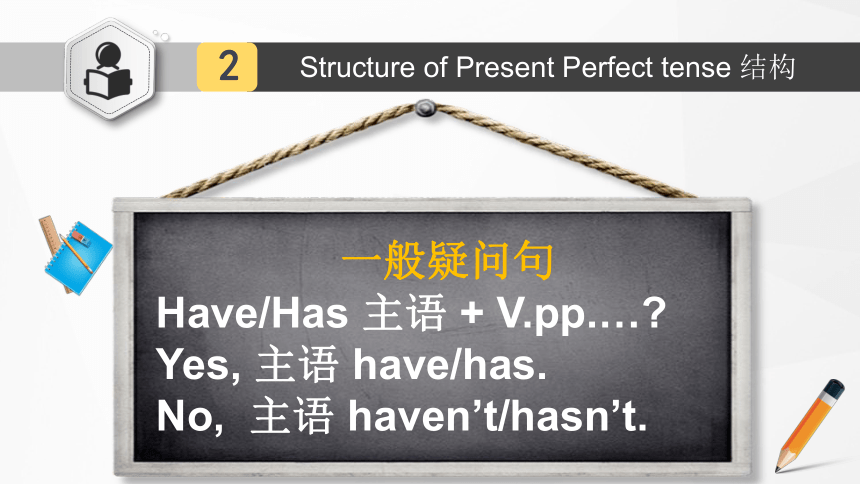
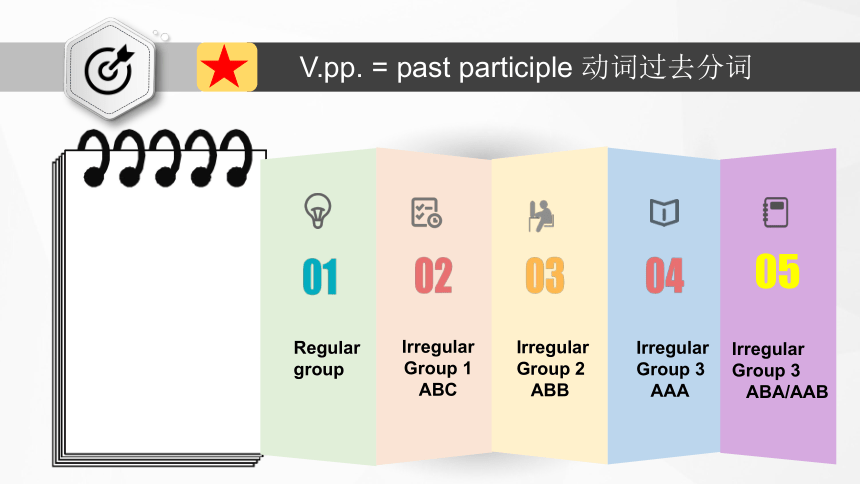
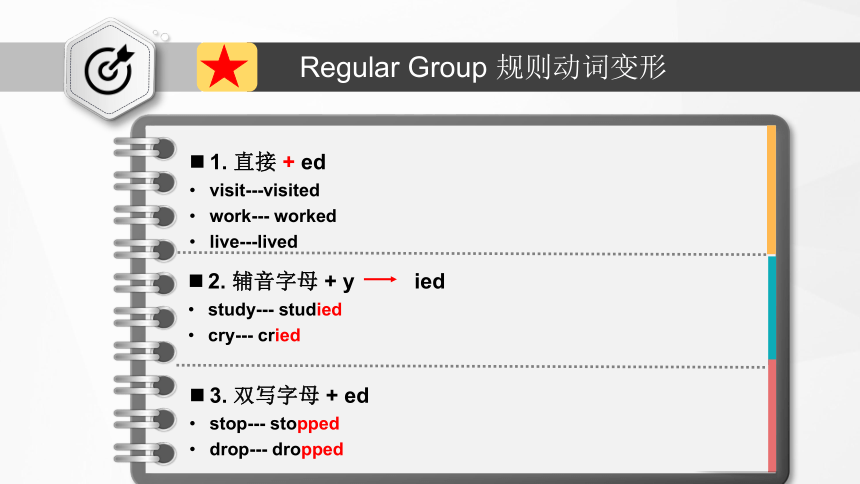
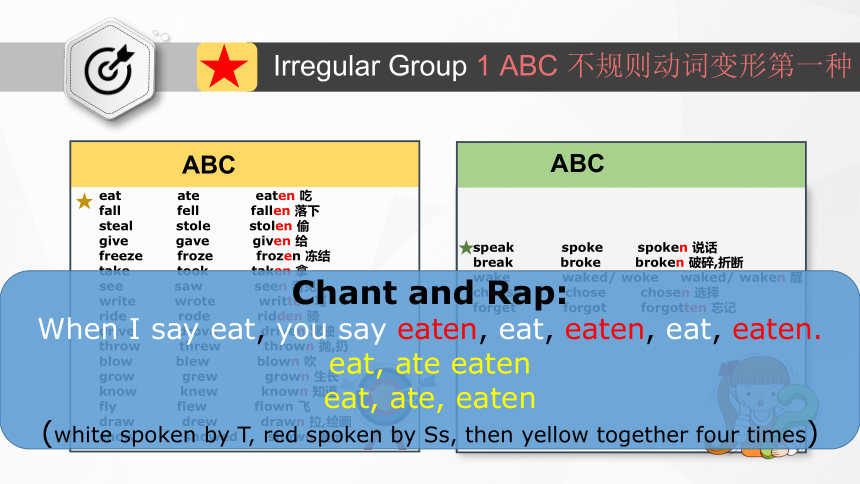
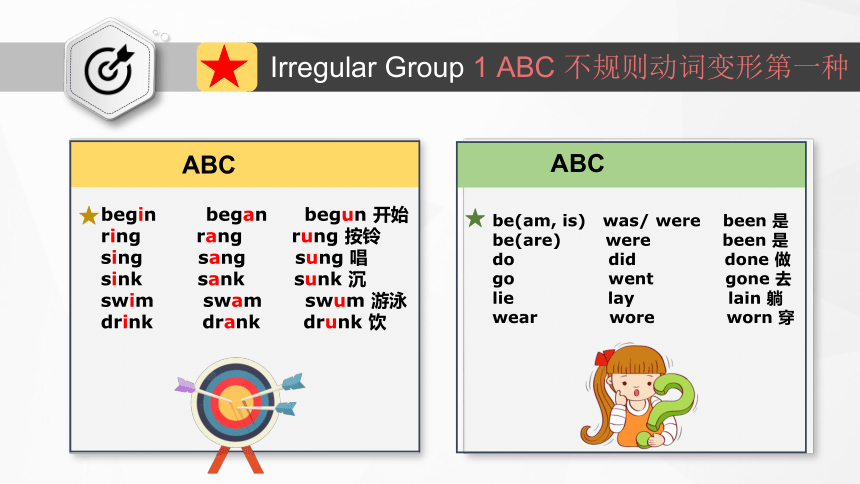
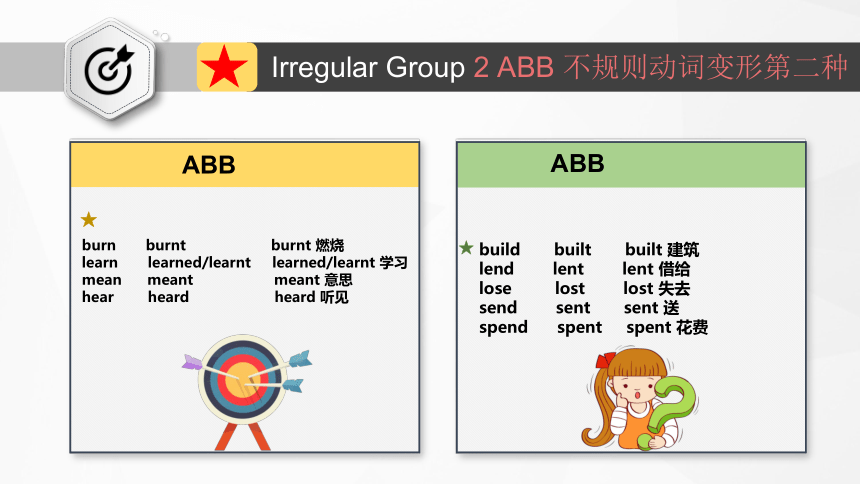
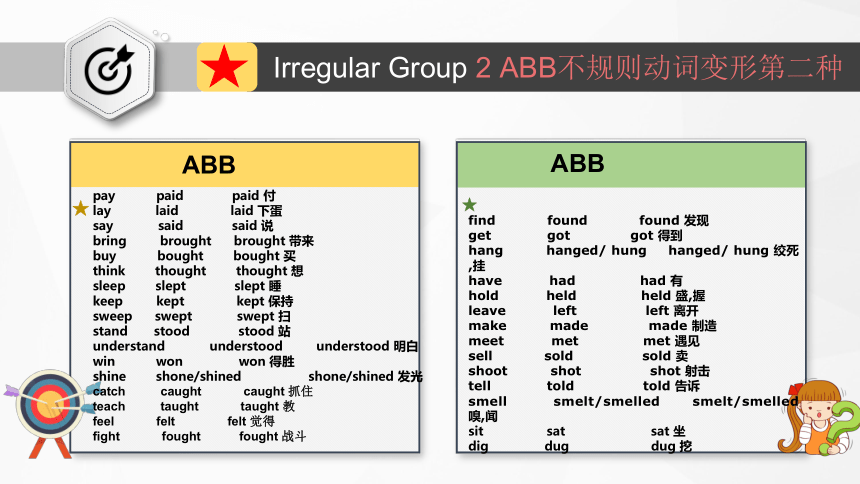
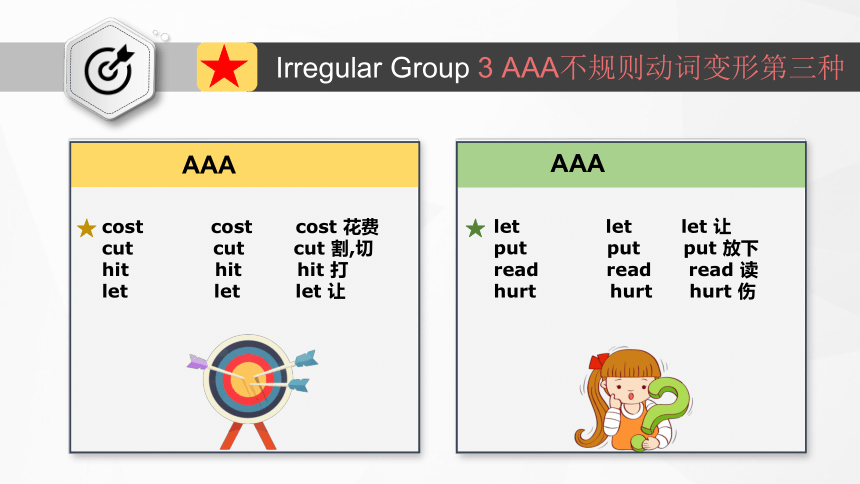
文档简介
(共39张PPT)
Present Perfect Tense
现在完成时
Contents
Definition of Present Perfect tense
现在完成时的定义
3. Usage of Present Perfect tense
现在完成时的用法
4. Exercises of Present Perfect tense
现在完成时的练习
2. Structure of Present Perfect tense
现在完成时的结构
1
Definition of Present Perfect tense 定义
1、表示动作到现在为止已经完成或刚刚完成;
2、表示过去发生的动作或事情对现在的影响和产生的结果;它强调的是过去的动作同现在的联系。
Structure of Present Perfect tense 结构
2
肯定句 主语 + have/has + V.pp.
否定句 主语 + have/has not + V.pp.
have not = haven’t
has not = hasn’t
Structure of Present Perfect tense 结构
2
一般疑问句
Have/Has 主语 + V.pp.…
Yes, 主语 have/has.
No, 主语 haven’t/hasn’t.
V.pp. = past participle 动词过去分词
01
02
03
Regular
group
Irregular
Group 1
ABC
Irregular
Group 2
ABB
04
Irregular
Group 3
AAA
Irregular
Group 3
ABA/AAB
05
Regular Group 规则动词变形
3. 双写字母 + ed
stop--- stopped
drop--- dropped
2. 辅音字母 + y ied
study--- studied
cry--- cried
1. 直接 + ed
visit---visited
work--- worked
live---lived
Irregular Group 1 ABC 不规则动词变形第一种
ABC
ABC
★
eat ate eaten 吃
fall fell fallen 落下
steal stole stolen 偷
give gave given 给
freeze froze frozen 冻结
take took taken 拿
see saw seen 看见
write wrote written 写
ride rode ridden 骑
drive drove driven 驾驶
throw threw thrown 抛,扔
blow blew blown 吹
grow grew grown 生长
know knew known 知道
fly flew flown 飞
draw drew drawn 拉,绘画
show showed shown 展示
speak spoke spoken 说话
break broke broken 破碎,折断
wake waked/ woke waked/ waken 醒
choose chose chosen 选择
forget forgot forgotten 忘记
★
Chant and Rap:
When I say eat, you say eaten, eat, eaten, eat, eaten.
eat, ate eaten
eat, ate, eaten
(white spoken by T, red spoken by Ss, then yellow together four times)
Irregular Group 1 ABC 不规则动词变形第一种
ABC
ABC
★
begin began begun 开始
ring rang rung 按铃
sing sang sung 唱
sink sank sunk 沉
swim swam swum 游泳
drink drank drunk 饮
★
be(am, is) was/ were been 是
be(are) were been 是
do did done 做
go went gone 去
lie lay lain 躺
wear wore worn 穿
Irregular Group 2 ABB 不规则动词变形第二种
ABB
ABB
burn burnt burnt 燃烧
learn learned/learnt learned/learnt 学习
mean meant meant 意思
hear heard heard 听见
★
build built built 建筑
lend lent lent 借给
lose lost lost 失去
send sent sent 送
spend spent spent 花费
★
Irregular Group 2 ABB不规则动词变形第二种
ABB
ABB
pay paid paid 付
lay laid laid 下蛋
say said said 说
bring brought brought 带来
buy bought bought 买
think thought thought 想
sleep slept slept 睡
keep kept kept 保持
sweep swept swept 扫
stand stood stood 站
understand understood understood 明白
win won won 得胜
shine shone/shined shone/shined 发光
catch caught caught 抓住
teach taught taught 教
feel felt felt 觉得
fight fought fought 战斗
★
find found found 发现
get got got 得到
hang hanged/ hung hanged/ hung 绞死,挂
have had had 有
hold held held 盛,握
leave left left 离开
make made made 制造
meet met met 遇见
sell sold sold 卖
shoot shot shot 射击
tell told told 告诉
smell smelt/smelled smelt/smelled 嗅,闻
sit sat sat 坐
dig dug dug 挖
★
Irregular Group 3 AAA不规则动词变形第三种
AAA
AAA
cost cost cost 花费
cut cut cut 割,切
hit hit hit 打
let let let 让
let let let 让
put put put 放下
read read read 读
hurt hurt hurt 伤
★
★
Irregular Group 4 ABA/AAB 第四种
ABA
AAB
come came come 来
become became become 变
run ran run 跑
beat beat beaten 打
★
★
Usage of Present Perfect tense 用法
3
Usage of Present Perfect tense
Adverbs of time
时间副词(标志词)
for & since
have gone to/have been to/have been in
Durational Verbs & Momentary Verbs
延续性动词& 短暂性动词
Adverbs of time
already
已经(肯定句)
yet
已经(一疑句)
还(否定句)
ever
曾经(一疑句)
never
从来不
just
刚刚
so far
到目前为止
I have already read Little Women.
I haven’t read Little Women yet.
Have you read Little Women yet
Have you ever read Little Women
I have never read Little Women.
I have just finished reading Little Women.
I have only planted 100 trees so far.
I have read Robinson Crusoe twice.
twice/其他倍数
两次、几次
Practice
Tips: try to judge the types of each sentence like statement, negative or yes-no question
根据句意, 用上一页的时间副词填空:
I have __________________ finished my homework.
He has not begun to work _____.
I have ______ finished my lunch.
Have you _____ been to the park No, ______.
Have you seen the movie _____
She has learned 3000 English words ________.
already/just
yet
just
ever
never
yet
so far
Purpose: The video is arranged here in order to know how we use the present perfect tense correctly, especially since here.
Step1. Watching
for & since 用法
Show a video
Jo, we’ve got to have it out. 乔,我们得敞开心扉谈谈。
I have loved you ever since I have known you, Jo. I couldn’t help it.从我认识你时我就爱上了你, 乔,我不能自已。
Step2. Understanding
for
since “自……以后;从……以来”
★ for + 段时间
★ since + 点时间
★ since + 句子(一般过去时).
E.g.
1) I have lived here for more than twenty years.
我在这儿住了二十多年了。
= I have lived here since twenty years ago.(通常可以与“since+过去的时间点”互换使用)
E.g.
1) I have lived here since I was born.
我从出生起就住在这里。
2) I have lived here since twenty years ago.
我在这里住了二十多年了。
Attention:
现在完成时中,如果有since/for出现,其主句的谓语动词通常是延续性动词。
对since/for引导的状语提问要用how long.
短暂性动词的否定形式可以和since/for搭配使用。
since last Friday
since two days ago
since 2000
I have studied English for 20 years.
I have studied English since 20 years ago.
How long have you studied English
Cindy hasn’t called me since she went
to London.
Practice
Attention: try to notice the adverbs of time.
Ms. Li has been in hospital ______ last week.
I have stayed at my aunt’s ______ two weeks.
I’ve known her ______ we were children.
She has been away from Xi’an _____ about ten years.
It’s about ten years ______ she left the city.
The old man has worked in this clinic _______ 1980.
I have been here _______ two o’clock ago.
since
for
since
for
since
since
since
Attention: has been to + 地点表示某人曾去过某地(现已回来),后面常跟次数或者ever等词。
have gone to/ have been to/have been in 区别
Paddington has been to London.
Bye,
London!
Attention: has been in + 地点表示某人一直在某地,常跟段时间状语连用。(如果地点是here、there省略in)
Paddington has been in London for a week.
I love London!
have gone to/ have been to/have been in 区别
Paddington has gone to London.
Attention: has gone to + 地点表示某人在去某地途中或到了某地(现在还没有回来)
Hello,
London!
have gone to/ have been to/have been in 区别
Practice
Tips: try to get the meaning of each sentence.
-Where is Tom?- He __________ England.
A. has gone to B. has been to
2. A number of tourists _______ Xi’an many times because it is such a beautiful city.
A. have been to B. has been to
C. have gone to D. has gone to
3. Kate ____________ (be) in Shanghai since 2000.
has been
Momentary
Verbs
Durational
Verbs
延续性动词Durational Verbs & 短暂性动词Momentary Verbs
延续性动词表示能够延续的动作词,表示经过,经历。
常与段时间连用。
短暂性动词也为瞬间动词,表示这种动作发生后就立刻结束。
不能跟段时间连。
Have a look
Attention:
try to memorize these verbs either durational verbs or momentary verbs;
try to classify them. 分类不同的动词
-Can I borrow your book
- Of course. You can borrow it for a month.
T or F
Can you point out the mistake in the sentences
Yes. We can not use borrow with for a month.
Because borrow is a momentary verb. We need to change borrow into a durational verb, keep.
keep
Learn & Memorize
Attention: 当句子中有段时间状语时,一定要把短暂性动词换成延续性动词。
延续性与短暂性动词是可以互换的。
①转化为其他动词:
buy→ have, borrow→ keep, become→ be等;
②转化为“be +形容词/副词/介词短语”:
begin/start→ be on die→ be dead
finish→ be over marry→ be married
sleep→ be asleep return→ be back
arrive→ be here leave/go→ be away
close/open→ be closed/open,
Practice
Tips: try to memorize as often as you can.
arrive/come/go to die
become a borrow
Leave/ move
buy open
join
start/begin finish/ end
catch a cold get up
get to know get out
close wake up
go to sleep
become interested in
be in
be dead
have
keep
be away / be out
be a
be in/a member of
be open
be on
be over
have a cold
be up
know
be out
be closed
be awake
be asleep/ sleep
be interested in
Practice:Correcting
Tips: try to pay attention to the time.
1. I have borrowed the book for 3 months.
2. I have left Shanghai for three days.
3. Jack and Tom have lived here since 5years.
4. The film has been on since I have come to the cinema.
5. His pet dog has died for two years.
6. Jim has gone to Beijing for 2 years.
7.I have gone to No.1 Middle School twice.
8. How long have you come to the United States?
have kept
been away
since 5 years ago/ for 5 years
came
been dead
has been in
been to
been in
Practice:Translating
Tips: try to understand the sentence.
这本书我借了一个月了。
I borrowed this book a month ago.
I have kept the book for a month /since a month ago.
A month has passed since I borrowed the book.
It is/ has been a month since I borrowed the book.
特殊用法
!
It is/ has been+段时间+since从句.
段时间+has passed+ since从句.
3. It’s the first time that… have/has done….
4. This is the best film that I have ever seen.
5. 表示动作一直持续到现在的状态。如:The meeting has lasted five days.
特殊用法
!
6.在时间状语从句,条件状语从句或让步状语从句中表达将来某时已经完成的动作
When you have learned English, you will find it a bridge to so much knowledge.
We’ll start at six if it has stopped raining by then.
※这里的现在完成时强调从句动作在主句动作之前完成, 如果两个动作同时或几乎同时发生, 则不必用完成时 .试比较:
I’ll let you know as soon as I hear from her.
She will call you when she gets home.
Present
Past Tense
Present
Perfect Tense
现在完成时& 一般过去时
但现在完成时注意的不是事情本身,而是强调事情与现在保持的某种密切联系(如现在的结果,影响,一直延续到现在等);
而一般过去时,则只讲述发生在过去的动作和事情与现在没有关系。
现在完成时和一般过去时都是说过去的事情
Present
Past Tense
一般过去时
Present
Perfect Tense
现在完成时
现在完成时& 一般过去时区别
We ________________ each other since we were nine or ten .
We ____________ each other when we were young .
Examples
(know)
have known
knew
Present
Past Tense
一般过去时
Present
Perfect Tense
现在完成时
现在完成时& 一般过去时区别
I _____ just _____ him twice.
I ________ him just now .
Examples
(see)
have
saw
seen
Present
Past Tense
一般过去时
Present
Perfect Tense
现在完成时
现在完成时& 一般过去时区别
Have
--______ you _________your bike --Yes, I _______.
--When_______ you _______ it
--I __________ it yesterday.
Examples
(repair)
repaired
have
did
repair
repaired
Practice
!
My good friend ______ this car for more then ten years.
A. has had B. has bought C. have had D. buys
-Where is your sister
- She ________ France and she ________ Paris for two weeks.
A. has been to, has been in B. has gone to, will stay in
C. has been in, has been to D. has stayed in, has gone to
-This is a really old bike. – Yes, I _____ it for seven years.
A. have had B. have bought C. bought
- How many letters _____ you ____ to your mother- 109 in all, since 2016.
A. has, written B. have, written C. did, write D. are, writing
-Why are you so worried
- The movie will start in 20 minutes, but the bus ____ hasn’t come.
A. still B. already C. always
Practice
!
6. Our school life _____ a lot since 2017. We have more activities now.
A. changes B. changed C. will change D. has changed
7. –Is everyone here today, Jonathan
- No, sir. Mike is absent. He ________ for two days.
A. has fallen ill B. has been ill
C. fell ill D. was ill
8. My father _______ in a panda protection center for 10 years, so he knows a lot about panda.
A. was working B. is working
C. has worked D. will work
9. The shop in Wanda Square ________ for six years, but I _______ there so far.
A. has opened, haven’t gone B. has been open, haven’t been
C. has been open, haven’t gone D. has been opened, haven’t been
Practice
!
我们以前已经看过那部电影了。
We _______________ that film before.
2. Linda已经获得了一份奖学金。
Linda ______________ obtained a scholarship.
3. 我从来没有听到Demo说她的坏话。
I ____________________ Demo say anything against her..
4. 你以前去过香港吗?
___________ you ____________ been to Hong Kong
5. 我的英语老师已离开这个城市了。
My English teacher ________________________________ the city.
6. 她已经借了这张桌子三个月了。
She ________________ the table for three months.
7. 自上个星期以来他一直很忙。
He ___________________ busy _____________ last week.
have seen
has already
have never heard
since
Have
ever
has been away from
has kept
has been
Present Perfect Tense
现在完成时
Contents
Definition of Present Perfect tense
现在完成时的定义
3. Usage of Present Perfect tense
现在完成时的用法
4. Exercises of Present Perfect tense
现在完成时的练习
2. Structure of Present Perfect tense
现在完成时的结构
1
Definition of Present Perfect tense 定义
1、表示动作到现在为止已经完成或刚刚完成;
2、表示过去发生的动作或事情对现在的影响和产生的结果;它强调的是过去的动作同现在的联系。
Structure of Present Perfect tense 结构
2
肯定句 主语 + have/has + V.pp.
否定句 主语 + have/has not + V.pp.
have not = haven’t
has not = hasn’t
Structure of Present Perfect tense 结构
2
一般疑问句
Have/Has 主语 + V.pp.…
Yes, 主语 have/has.
No, 主语 haven’t/hasn’t.
V.pp. = past participle 动词过去分词
01
02
03
Regular
group
Irregular
Group 1
ABC
Irregular
Group 2
ABB
04
Irregular
Group 3
AAA
Irregular
Group 3
ABA/AAB
05
Regular Group 规则动词变形
3. 双写字母 + ed
stop--- stopped
drop--- dropped
2. 辅音字母 + y ied
study--- studied
cry--- cried
1. 直接 + ed
visit---visited
work--- worked
live---lived
Irregular Group 1 ABC 不规则动词变形第一种
ABC
ABC
★
eat ate eaten 吃
fall fell fallen 落下
steal stole stolen 偷
give gave given 给
freeze froze frozen 冻结
take took taken 拿
see saw seen 看见
write wrote written 写
ride rode ridden 骑
drive drove driven 驾驶
throw threw thrown 抛,扔
blow blew blown 吹
grow grew grown 生长
know knew known 知道
fly flew flown 飞
draw drew drawn 拉,绘画
show showed shown 展示
speak spoke spoken 说话
break broke broken 破碎,折断
wake waked/ woke waked/ waken 醒
choose chose chosen 选择
forget forgot forgotten 忘记
★
Chant and Rap:
When I say eat, you say eaten, eat, eaten, eat, eaten.
eat, ate eaten
eat, ate, eaten
(white spoken by T, red spoken by Ss, then yellow together four times)
Irregular Group 1 ABC 不规则动词变形第一种
ABC
ABC
★
begin began begun 开始
ring rang rung 按铃
sing sang sung 唱
sink sank sunk 沉
swim swam swum 游泳
drink drank drunk 饮
★
be(am, is) was/ were been 是
be(are) were been 是
do did done 做
go went gone 去
lie lay lain 躺
wear wore worn 穿
Irregular Group 2 ABB 不规则动词变形第二种
ABB
ABB
burn burnt burnt 燃烧
learn learned/learnt learned/learnt 学习
mean meant meant 意思
hear heard heard 听见
★
build built built 建筑
lend lent lent 借给
lose lost lost 失去
send sent sent 送
spend spent spent 花费
★
Irregular Group 2 ABB不规则动词变形第二种
ABB
ABB
pay paid paid 付
lay laid laid 下蛋
say said said 说
bring brought brought 带来
buy bought bought 买
think thought thought 想
sleep slept slept 睡
keep kept kept 保持
sweep swept swept 扫
stand stood stood 站
understand understood understood 明白
win won won 得胜
shine shone/shined shone/shined 发光
catch caught caught 抓住
teach taught taught 教
feel felt felt 觉得
fight fought fought 战斗
★
find found found 发现
get got got 得到
hang hanged/ hung hanged/ hung 绞死,挂
have had had 有
hold held held 盛,握
leave left left 离开
make made made 制造
meet met met 遇见
sell sold sold 卖
shoot shot shot 射击
tell told told 告诉
smell smelt/smelled smelt/smelled 嗅,闻
sit sat sat 坐
dig dug dug 挖
★
Irregular Group 3 AAA不规则动词变形第三种
AAA
AAA
cost cost cost 花费
cut cut cut 割,切
hit hit hit 打
let let let 让
let let let 让
put put put 放下
read read read 读
hurt hurt hurt 伤
★
★
Irregular Group 4 ABA/AAB 第四种
ABA
AAB
come came come 来
become became become 变
run ran run 跑
beat beat beaten 打
★
★
Usage of Present Perfect tense 用法
3
Usage of Present Perfect tense
Adverbs of time
时间副词(标志词)
for & since
have gone to/have been to/have been in
Durational Verbs & Momentary Verbs
延续性动词& 短暂性动词
Adverbs of time
already
已经(肯定句)
yet
已经(一疑句)
还(否定句)
ever
曾经(一疑句)
never
从来不
just
刚刚
so far
到目前为止
I have already read Little Women.
I haven’t read Little Women yet.
Have you read Little Women yet
Have you ever read Little Women
I have never read Little Women.
I have just finished reading Little Women.
I have only planted 100 trees so far.
I have read Robinson Crusoe twice.
twice/其他倍数
两次、几次
Practice
Tips: try to judge the types of each sentence like statement, negative or yes-no question
根据句意, 用上一页的时间副词填空:
I have __________________ finished my homework.
He has not begun to work _____.
I have ______ finished my lunch.
Have you _____ been to the park No, ______.
Have you seen the movie _____
She has learned 3000 English words ________.
already/just
yet
just
ever
never
yet
so far
Purpose: The video is arranged here in order to know how we use the present perfect tense correctly, especially since here.
Step1. Watching
for & since 用法
Show a video
Jo, we’ve got to have it out. 乔,我们得敞开心扉谈谈。
I have loved you ever since I have known you, Jo. I couldn’t help it.从我认识你时我就爱上了你, 乔,我不能自已。
Step2. Understanding
for
since “自……以后;从……以来”
★ for + 段时间
★ since + 点时间
★ since + 句子(一般过去时).
E.g.
1) I have lived here for more than twenty years.
我在这儿住了二十多年了。
= I have lived here since twenty years ago.(通常可以与“since+过去的时间点”互换使用)
E.g.
1) I have lived here since I was born.
我从出生起就住在这里。
2) I have lived here since twenty years ago.
我在这里住了二十多年了。
Attention:
现在完成时中,如果有since/for出现,其主句的谓语动词通常是延续性动词。
对since/for引导的状语提问要用how long.
短暂性动词的否定形式可以和since/for搭配使用。
since last Friday
since two days ago
since 2000
I have studied English for 20 years.
I have studied English since 20 years ago.
How long have you studied English
Cindy hasn’t called me since she went
to London.
Practice
Attention: try to notice the adverbs of time.
Ms. Li has been in hospital ______ last week.
I have stayed at my aunt’s ______ two weeks.
I’ve known her ______ we were children.
She has been away from Xi’an _____ about ten years.
It’s about ten years ______ she left the city.
The old man has worked in this clinic _______ 1980.
I have been here _______ two o’clock ago.
since
for
since
for
since
since
since
Attention: has been to + 地点表示某人曾去过某地(现已回来),后面常跟次数或者ever等词。
have gone to/ have been to/have been in 区别
Paddington has been to London.
Bye,
London!
Attention: has been in + 地点表示某人一直在某地,常跟段时间状语连用。(如果地点是here、there省略in)
Paddington has been in London for a week.
I love London!
have gone to/ have been to/have been in 区别
Paddington has gone to London.
Attention: has gone to + 地点表示某人在去某地途中或到了某地(现在还没有回来)
Hello,
London!
have gone to/ have been to/have been in 区别
Practice
Tips: try to get the meaning of each sentence.
-Where is Tom?- He __________ England.
A. has gone to B. has been to
2. A number of tourists _______ Xi’an many times because it is such a beautiful city.
A. have been to B. has been to
C. have gone to D. has gone to
3. Kate ____________ (be) in Shanghai since 2000.
has been
Momentary
Verbs
Durational
Verbs
延续性动词Durational Verbs & 短暂性动词Momentary Verbs
延续性动词表示能够延续的动作词,表示经过,经历。
常与段时间连用。
短暂性动词也为瞬间动词,表示这种动作发生后就立刻结束。
不能跟段时间连。
Have a look
Attention:
try to memorize these verbs either durational verbs or momentary verbs;
try to classify them. 分类不同的动词
-Can I borrow your book
- Of course. You can borrow it for a month.
T or F
Can you point out the mistake in the sentences
Yes. We can not use borrow with for a month.
Because borrow is a momentary verb. We need to change borrow into a durational verb, keep.
keep
Learn & Memorize
Attention: 当句子中有段时间状语时,一定要把短暂性动词换成延续性动词。
延续性与短暂性动词是可以互换的。
①转化为其他动词:
buy→ have, borrow→ keep, become→ be等;
②转化为“be +形容词/副词/介词短语”:
begin/start→ be on die→ be dead
finish→ be over marry→ be married
sleep→ be asleep return→ be back
arrive→ be here leave/go→ be away
close/open→ be closed/open,
Practice
Tips: try to memorize as often as you can.
arrive/come/go to die
become a borrow
Leave/ move
buy open
join
start/begin finish/ end
catch a cold get up
get to know get out
close wake up
go to sleep
become interested in
be in
be dead
have
keep
be away / be out
be a
be in/a member of
be open
be on
be over
have a cold
be up
know
be out
be closed
be awake
be asleep/ sleep
be interested in
Practice:Correcting
Tips: try to pay attention to the time.
1. I have borrowed the book for 3 months.
2. I have left Shanghai for three days.
3. Jack and Tom have lived here since 5years.
4. The film has been on since I have come to the cinema.
5. His pet dog has died for two years.
6. Jim has gone to Beijing for 2 years.
7.I have gone to No.1 Middle School twice.
8. How long have you come to the United States?
have kept
been away
since 5 years ago/ for 5 years
came
been dead
has been in
been to
been in
Practice:Translating
Tips: try to understand the sentence.
这本书我借了一个月了。
I borrowed this book a month ago.
I have kept the book for a month /since a month ago.
A month has passed since I borrowed the book.
It is/ has been a month since I borrowed the book.
特殊用法
!
It is/ has been+段时间+since从句.
段时间+has passed+ since从句.
3. It’s the first time that… have/has done….
4. This is the best film that I have ever seen.
5. 表示动作一直持续到现在的状态。如:The meeting has lasted five days.
特殊用法
!
6.在时间状语从句,条件状语从句或让步状语从句中表达将来某时已经完成的动作
When you have learned English, you will find it a bridge to so much knowledge.
We’ll start at six if it has stopped raining by then.
※这里的现在完成时强调从句动作在主句动作之前完成, 如果两个动作同时或几乎同时发生, 则不必用完成时 .试比较:
I’ll let you know as soon as I hear from her.
She will call you when she gets home.
Present
Past Tense
Present
Perfect Tense
现在完成时& 一般过去时
但现在完成时注意的不是事情本身,而是强调事情与现在保持的某种密切联系(如现在的结果,影响,一直延续到现在等);
而一般过去时,则只讲述发生在过去的动作和事情与现在没有关系。
现在完成时和一般过去时都是说过去的事情
Present
Past Tense
一般过去时
Present
Perfect Tense
现在完成时
现在完成时& 一般过去时区别
We ________________ each other since we were nine or ten .
We ____________ each other when we were young .
Examples
(know)
have known
knew
Present
Past Tense
一般过去时
Present
Perfect Tense
现在完成时
现在完成时& 一般过去时区别
I _____ just _____ him twice.
I ________ him just now .
Examples
(see)
have
saw
seen
Present
Past Tense
一般过去时
Present
Perfect Tense
现在完成时
现在完成时& 一般过去时区别
Have
--______ you _________your bike --Yes, I _______.
--When_______ you _______ it
--I __________ it yesterday.
Examples
(repair)
repaired
have
did
repair
repaired
Practice
!
My good friend ______ this car for more then ten years.
A. has had B. has bought C. have had D. buys
-Where is your sister
- She ________ France and she ________ Paris for two weeks.
A. has been to, has been in B. has gone to, will stay in
C. has been in, has been to D. has stayed in, has gone to
-This is a really old bike. – Yes, I _____ it for seven years.
A. have had B. have bought C. bought
- How many letters _____ you ____ to your mother- 109 in all, since 2016.
A. has, written B. have, written C. did, write D. are, writing
-Why are you so worried
- The movie will start in 20 minutes, but the bus ____ hasn’t come.
A. still B. already C. always
Practice
!
6. Our school life _____ a lot since 2017. We have more activities now.
A. changes B. changed C. will change D. has changed
7. –Is everyone here today, Jonathan
- No, sir. Mike is absent. He ________ for two days.
A. has fallen ill B. has been ill
C. fell ill D. was ill
8. My father _______ in a panda protection center for 10 years, so he knows a lot about panda.
A. was working B. is working
C. has worked D. will work
9. The shop in Wanda Square ________ for six years, but I _______ there so far.
A. has opened, haven’t gone B. has been open, haven’t been
C. has been open, haven’t gone D. has been opened, haven’t been
Practice
!
我们以前已经看过那部电影了。
We _______________ that film before.
2. Linda已经获得了一份奖学金。
Linda ______________ obtained a scholarship.
3. 我从来没有听到Demo说她的坏话。
I ____________________ Demo say anything against her..
4. 你以前去过香港吗?
___________ you ____________ been to Hong Kong
5. 我的英语老师已离开这个城市了。
My English teacher ________________________________ the city.
6. 她已经借了这张桌子三个月了。
She ________________ the table for three months.
7. 自上个星期以来他一直很忙。
He ___________________ busy _____________ last week.
have seen
has already
have never heard
since
Have
ever
has been away from
has kept
has been
同课章节目录
